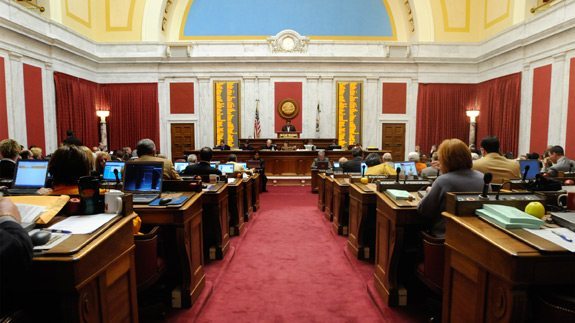West Virginia House Advances Proposed 20-Week Abortion Ban (Updated)
A bill to ban abortions at 20 weeks passed out of a house committee Monday, after a failed procedural maneuver to pass a similar bill made house Democrats a target of anti-choice falsehoods.

UPDATE, February 18, 5:54 p.m.: This article has been updated to reflect the fact that the bill is now moving to the House Judiciary Committee.
With reporting by Sharona Coutts
A bill that would ban abortions at 20 weeks post-fertilization is advancing through the West Virginia House of Delegates.
HB 4588, which passed out of a house committee Monday, is a replacement for a nearly identical bill, HB 2364, which was the subject of anti-choice misinformation and heated Democratic caucus debate last week.
West Virginians for Life falsely reported on LifeNews.com that Democrats had “killed” HB 2364, and constituents received robocalls to that effect. In fact, the bill failed a procedural vote that would have thwarted the traditional committee process. After that vote failed 48-48, with two Democrats siding with Republicans to discharge the bill from committee and force a floor vote on it, HB 2364 returned to where it started in the House Health and Human Services committee. There it was replaced with HB 4588, which passed on a voice vote with no discussion on Monday.
West Virginians for Life also published misinformation last September, when it circulated a letter citing now-debunked claims from anti-choice advocate Dr. Byron Calhoun about abortion complications in the state.
Last week’s failed procedural move to advance the 20-week abortion ban reportedly led Democratic caucus members to nearly come to blows in a heated closed-door session. Some anti-choice Democrats supported the bill on principle, but rejected the effort to rush the bill to passage and bypass committee review. Del. David Walker (D-Clay), who said he would never vote against an abortion bill, said he would also never vote to discharge a bill from committee in this way.
But those anti-choice Democrats may still have the chance to vote for a 20-week abortion ban. The bill now moves to the House Judiciary Committee. If it passes that committee, it will move to a full house floor vote, where it will likely pass.
Because no anti-choice organizations actively lobbied for the bill before the day of the discharge petition, Phil Kabler wrote in the Charleston Gazette, “One has to wonder if the real intent is to create a wedge issue to polarize the House, and energize anti-abortion voters, in hopes of setting the stage for a Republican takeover of the House in November.”
The bill, like nine other 20-week bans that have been enacted across the country, uses medically disproven assertions about fetal pain to justify restricting access to abortion. It includes narrow exceptions for cases in which there is a “medical emergency” but does not include exceptions for fetal abnormalities.
Only about 1 percent of abortions are performed after 20 weeks, usually due to fetal abnormality or maternal health issues. Such bans are also likely to be struck down in court, as was the case recently in Arizona, because they unconstitutionally ban abortion pre-viability.
New 20-week bans are also being considered in South Carolina and Mississippi. South Carolina’s ban, like West Virginia’s, includes no exceptions for rape, incest, or fetal abnormality. Mississippi’s includes no exceptions for rape or incest.
